[Article updated in Dec 2024]
A safari in the Kruger National Park is regarded by travelers around the world as one of the best in Africa, affording up-close encounters with the sought-after Big 5 and some rare and endangered animal species. Stretching across the provinces of Limpopo and Mpumalanga, the Kruger National Park is surrounded by a number of smaller game reserves that are collectively referred to as the Greater Kruger Park. It is important to understand the different regions of the Greater Kruger Park and how they fare in terms of wildlife sightings and experiences when compared to a safari in the Kruger.
Different Regions of the Greater Kruger Park
Greater Kruger Park vs Kruger Park:
What's The Difference?
This is a frequently asked question and one that can be easily answered by firstly looking at the similarities. The Kruger National Park spans across two million hectares and provides sanctuary to 147 mammal species and over 500 species of birds. The Greater Kruger Park and the Kruger Park has no fences which means that wildlife is free to roam between the two parks.
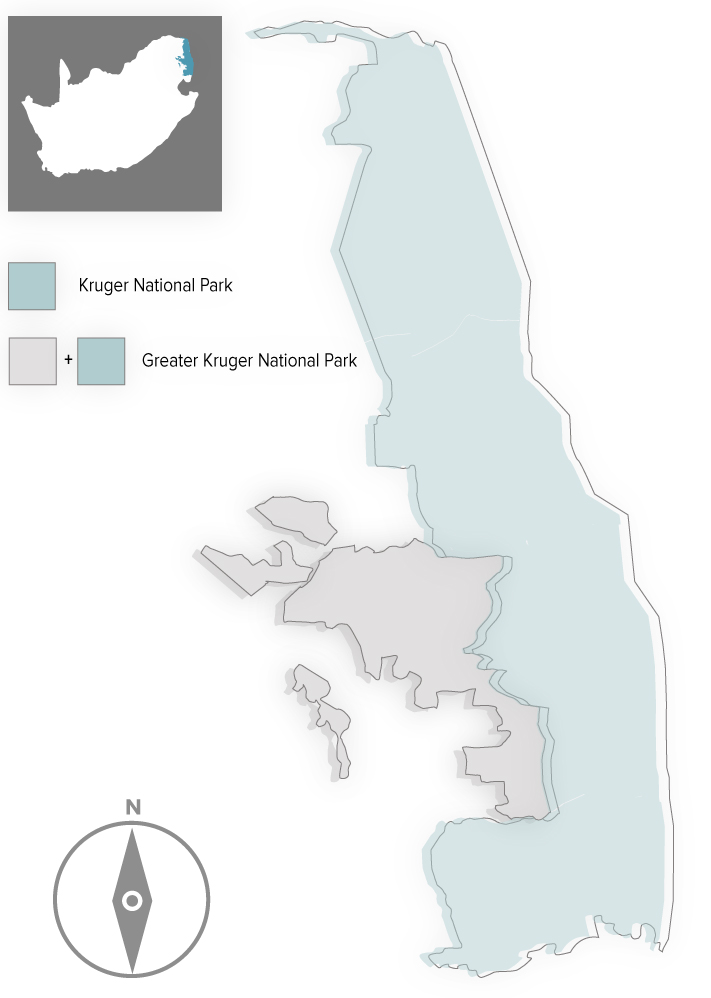
It is important to understand that the Kruger area is huge, the size of Israel to be precise! Although both parks enjoy the same fauna and flora, the habitats differ and so animals do tend to move toward habitats that are best for them. Some areas are well-known for their big cat sightings whilst others are great for spotting elephant and rhino etc. The Kruger Park is open to the public during the day, with 11 access gates and more than 850 kilometers of tarred roads to explore. Although the Greater Kruger Park can only be reached through these gates, once you enter the private reserve, this is where you will stay and the area you will traverse on during game drives and bush walks.
Game Reserves that form part of the Greater Kruger Park
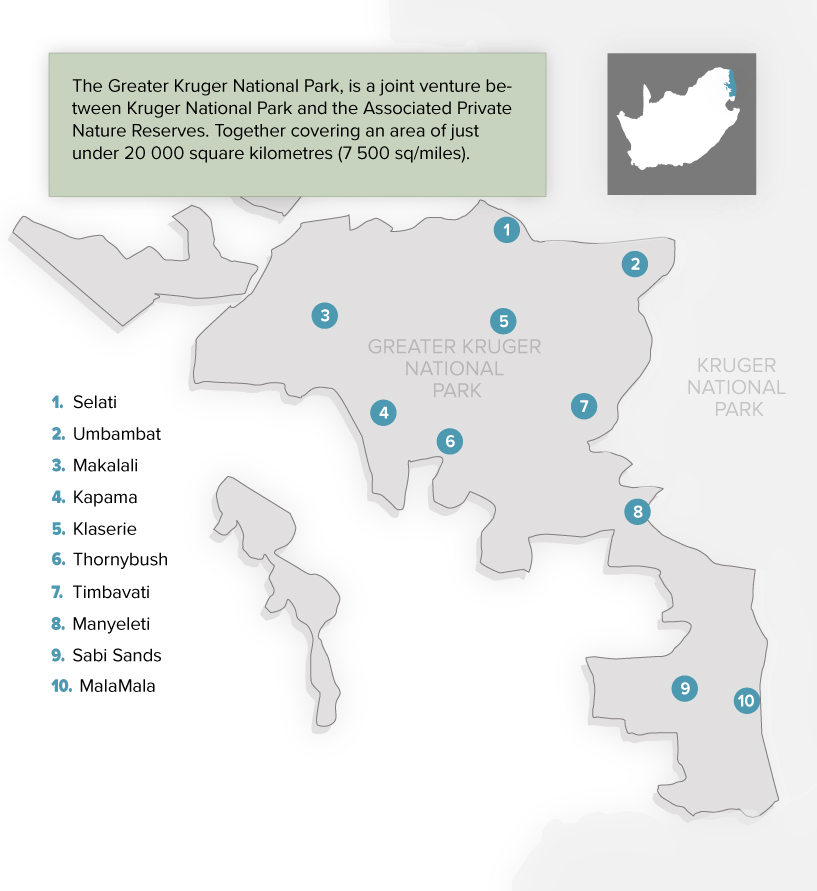
The Greater Kruger National Park is made up of over twenty private game reserves that span across 180 000 hectares. The most popular game reserves include: Timbavati, Thornybush, Manyeleti, Klaserie, Kapama and Sabi Sand Game Reserves.
Sabi Sands
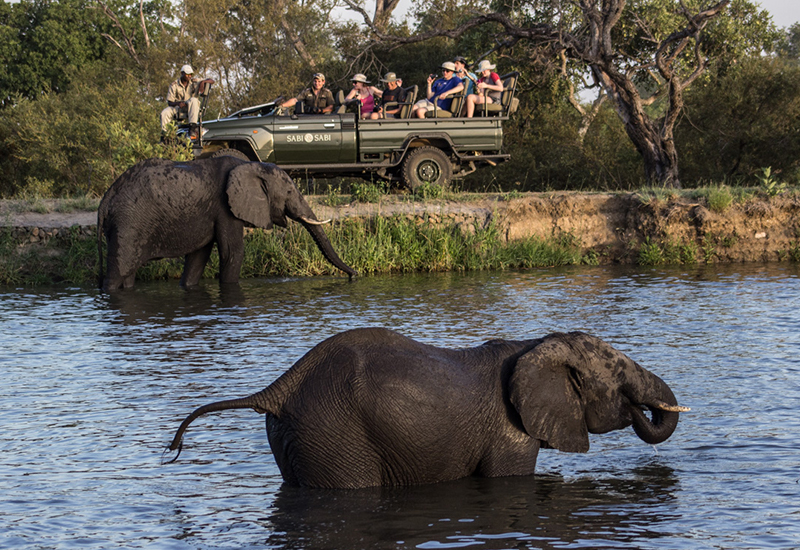
The Sabi Sands Private Game Reserve covers an area of 65,000 hectares and has diverse habitats that provide sanctuary to a number of animal and bird species. The Sabi River and Sand River run through the reserve, making it a prime game viewing area in the dry winter months when animals tend to gather at the remaining water sources. The private Sabi Sands Game Reserve incorporates the Lion Sands Game Reserve, Sabi Sabi Game Reserve, Mala Mala Game Reserve, Djuma Game Reserve, Singita Game Reserve and Ulusaba Private Game Reserve.
The Sabi Sands is well-known for its big cat sightings, most notably of the elusive leopard and an incredible bird-watching destination.
Accommodation Favorites:
Lion Sands Ivory Lodge, Sabi Sabi Earth Lodge, Ulusaba Rock Lodge, Singita Boulders, Leopard Hills.
Family Favorites:
Sabi Sabi Bush Lodge, Singita Ebony Lodge, Umkumbe Safari Lodge, Dulini River Lodge, Elephant Plains, Kirkmans Kamp.
Kapama
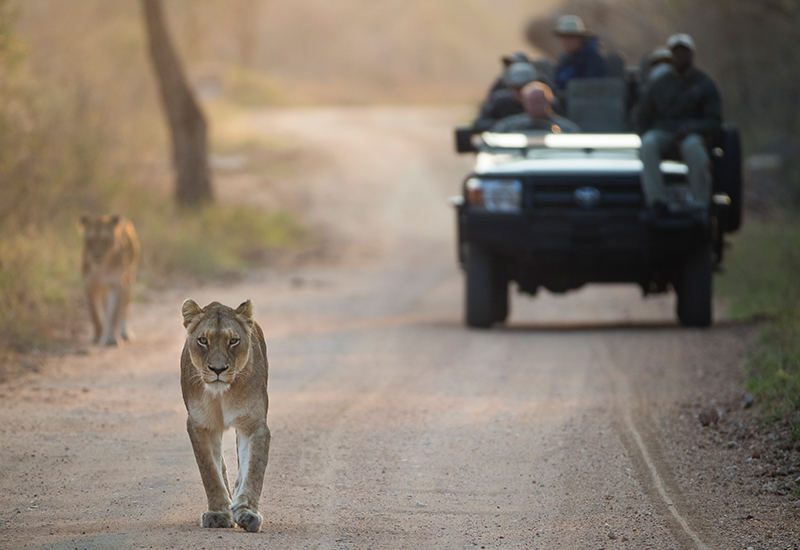
Kapama Private Game Reserve spans across an area of 13 000 hectares, with the Kapama River and Klaserie River running through the reserve. The reserve comprises of riverine forests and vast savannahs - the perfect habitats for an abundance of wildlife species. There are over 40 different mammal species but lion and elephant are especially easy to see in the reserve.Kapama Game Reserve nestles next to Thornybush Game Reserve and boasts five lodges and camps, ensuring a private Big 5 safari experience. Kapama Game Reserve offers the added experience of sleeping out on a platform for an evening, affording one the opportunity to truly experience the African bush.
Accommodation Favorites:
Kapama Buffalo Camp, Camp Jabulani, Kapama River Lodge, Kapama Southern Camp, Kapama Karula Lodge.
Family Favorites:
Kapama River Lodge, Kapama Southern Camp, Kapama Karula Lodge
Klaserie
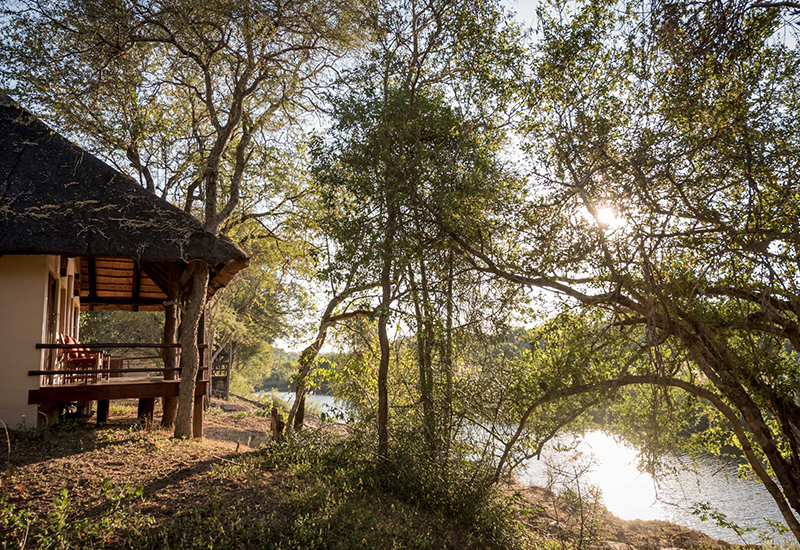
The Klaserie Nature Reserve is one of the largest privately owned game reserves in South Africa, covering an area of 60 000 hectares. The Klaserie reserve is recognized for its contributions to wildlife conservation with three incredible conservation projects on site: Ground Hornbill Project, Rhino Protection and The Elephant Project.Klaserie is known as big game country, with lion, leopard, elephant, rhino and buffalo are seen regularly on game drives. Bird watching is also incredible with regular sightings of eagles, owls, francolins, kingfishers, rollers and weavers. Klaserie is a great option for those who equally enjoy walking safaris as much as game drives.
Accommodation Favorites:
Africa on Foot, Klaserie Drift, Simbavati Camp George
Family Favorites:
Simbavati Camp George, Africa on Foot, Klaserie Drift.
Timbavati
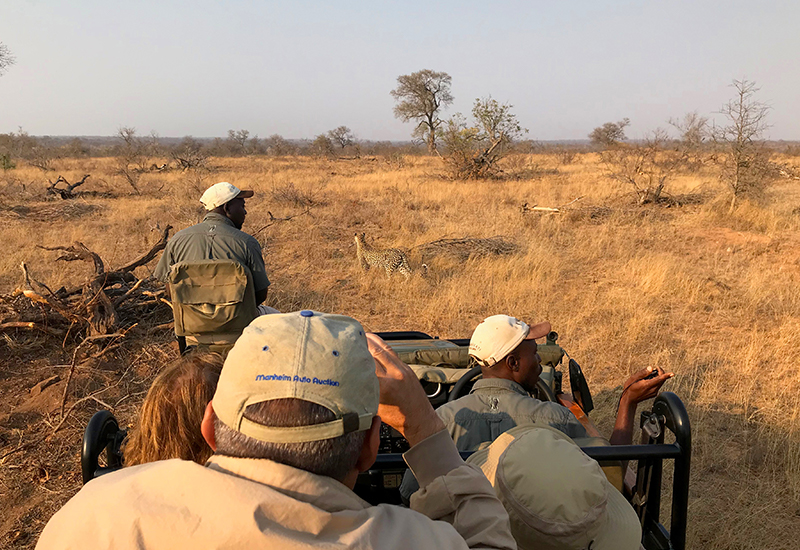
The Timbavati Game Reserve nestles between the Thornybush and Manyeleti Game Reserve and covers an area of 50,000 hectares. Timbavati incorporates Motswari Game Reserve, Ngala Game Reserve, Tanda Tula Game Reserve and Umlani Game Reserve. The sweeping Savannah of the Timbavati offers frequent sightings of hippo, giraffe, buffalo, zebra, wildebeest, lion, leopard, cheetah and hyena. The Timbavati is, however, most famous for its white lions. There are only a handful left in the wild, most of which have been seen in the Timbavati region.
Accommodation Favorites:
Ngala Tented Camp, Kings Camp, Simbavati Hilltop Lodge, Kambaku River Sands, Motswari, Tanda Tula.
Family Favorites:
Kambaku Safari Lodge, Simbavati River Lodge, Ngala Safari Lodge.
Thornybush
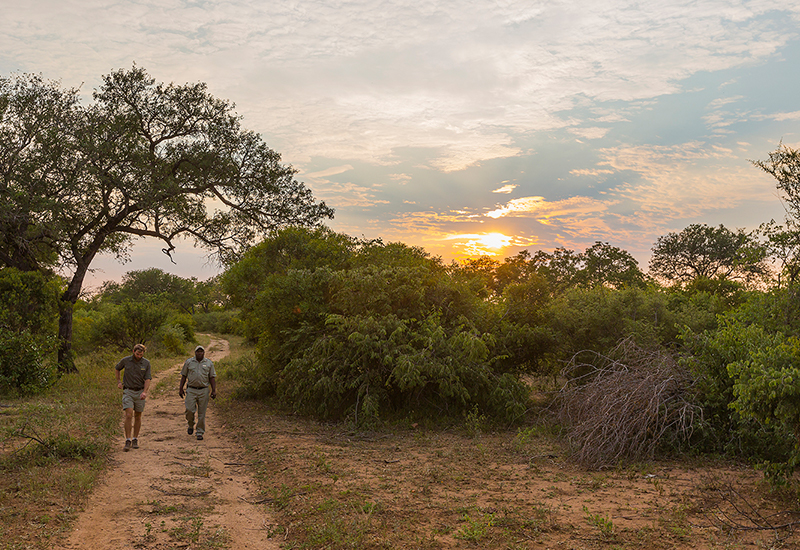
The private Thornybush Game Reserve nestles close to the town of Hoedspruit, in the Limpopo province of South Africa. The 14,000 hectare reserve boasts borders the Kapama Game Reserve and is located close to the Timbavati Game Reserve and the Kruger Park. The open Savannah is the perfect home for the Big Five, hyena, cheetah, hippo and wild dogs are seen regularly. Black rhino are regularly tracked in the reserve and night drives see species such as porcupines, caracal and civets. White lions have also been seen on several occasions from the neighboring Timbavati Game Reserve.
Accommodation Favorites:
Thornybush Game Lodge, Shumbalala Game Lodge, Serondella Lodge, Royal Malewane.
Family Favorites:
Monwana Game Lodge, Waterbuck Game Lodge, Serondella Lodge, Thornybush Game Lodge.
Manyeleti
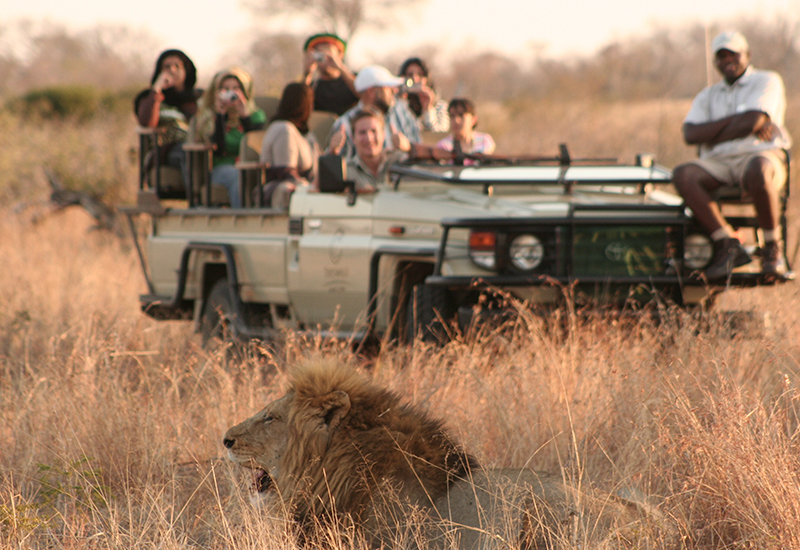
The reserve also has a low vehicle density, offering visitors a private safari experience.
Manyeleti Game Reserve nestles between the Sabi Sands and Timbavati game reserves and has no fences between these reserves and the Kruger Park. Although the 23,750 hectare Manyeleti Game Reserve is home to the Big 5, the bigger cats can sometimes be a little harder to find. The reserve is stocked with plenty of plains game and rare species such as sable antelope, cheetah, black-backed jackals and side-striped jackals are seen regularly. Manyeleti is a fantastic birding destination, with more than 450 species recorded in the reserve. European rollers, African grey hornbills, Scarlet-chested sunbirds and southern carmine bee-eaters are seen frequently.
Accommodation Favorites:
Tintswalo Safari Lodge, Honeyguide Khoka Moya Camp, Honeyguide Mantobeni Camp.
Family Favorites:
Tintswalo Safari Lodge, Honeyguide Khoka Moya Camp.
The Greater Kruger Safari Experience
The beauty of a safari in the Greater Kruger Park is the limited number of people allowed in the area, so travelers are guaranteed a far less crowded safari experience. With no fences between the Kruger National Park and the Greater Kruger Park, there is free movement of animals, allowing for incredible sightings. The privately-owned lodges in the Greater Kruger Park pride themselves on offering a more exclusive experience with several smaller camps offering luxurious rooms, exceptional service and a private safari with fewer guests on vehicles.
Safaris in the Greater Kruger Park are led by experienced guides who not only venture off-road to bring you the best game viewing, but also take you on walking safaris and night drives, bringing you that much closer to the wild! You will get to see the smallest of insects to birds and larger mammals like elephants, giraffes and lions. Each lodge in the Greater Kruger varies in its activities but generally guests can enjoy dawn and dusk open-vehicle game drives, bush walks, elephant interactions, hot air ballooning, bush dining and romantic sleep-out experiences in the bush.
Accessibility
For international travelers, the best way of accessing the Greater Kruger is by flying into Johannesburg’s OR Tambo International Airport and either connecting with a flight to Mpumalanga, Skukuza or Hoedspruit Airports; or joining one of our affordable overland safaris to the Kruger which include return road transfers from Johannesburg. Fly-in safaris are great for those travelers with limited time and those who would like to explore more than one area of the Kruger or combine their safari with a trip to Cape Town or Victoria Falls. Browse our Kruger Park Safaris for fly-in tour options from Cape Town and Johannesburg.
The Greater Kruger Park vs other Big 5 Game Reserves
Malaria Free Game Reserves
The Greater Kruger Park is a malaria area, so for families or travelers looking to go on safari without taking anti-malaria precautions should consider top game reserves such as Shamwari, Pilanesberg, Waterberg and Madikwe.
Wildlife Differences
Although game reserves such as Madikwe, Pilanesberg, Waterberg, Phinda and Shamwari all offer plenty of opportunities to spot the Big 5, the biggest difference between them other than their topography, is the land size and varying wildlife populations.
Madikwe is home to all members of the Big 5 but lion are the most commonly seen of the big cats. It is possible to spot cheetah and leopard but they aren’t as common as lions. Both black and white rhino are also widely seen, as well as wild dogs. In comparison to the Greater Kruger, wildlife viewing in Madikwe might not be as easy.
Pilanesberg is a short drive away from Johannesburg making it a more affordable safari option. The 57 200 hectare game reserve is home to more than 50 large mammal species and over 300 species of birds. The park is a lot smaller than the Kruger so it is possible to spot the Big 5 relatively quickly.
Waterberg is considered to be a UNESCO Biosphere Reserve that supports an incredible array of fauna and flora. The Waterberg Region incorporates Welgevonden Game Reserve, Kololo Game Reserve, Entabeni Game Reserve and Mabalingwe Nature Reserve. There are over 50 different mammal species, including the Big 5 and rare species such as brown hyena, pangolin, aardwolf and aardvark – all of which are best seen at night. The reserve is also an incredible bird watching destination with over 300 bird species to be seen.
Phinda Game Reserve nestles in northern KwaZulu Natal and spans across 28 555 hectares of pristine wilderness. The reserve has a unique topography, boasting riverine and rare sand forests. Phinda offers the ideal environment for a number of animal species to thrive, including lion, giraffe, white and black rhino, various antelope, elephant, leopard, buffalo, cheetah, and wildebeest. Next to the Kruger National Park, Phinda is an incredible bird watching destination with as many as 415 bird species.
Shamwari Game Reserve covers 20 000 hectares of verdant bush along the Bushmans River in the Eastern Cape, offering regular sightings of the Big 5, along with cheetah, caracal, wild dog and various antelope. Night drives often reveal nocturnal species such as the hopping springhare, aardwolf and brown hyena. Shamwari boasts over 250 bird species, including Black Harriers, Pale Chanting Goshawks, Black-shouldered Kites, Kingfishers and African Fish Eagles.
Budget Conscious Travelers
For budget-conscious travelers, it is important to choose a safari destination that matches your interests and budget. There are some great value for money 3-star luxury lodges within the Greater Kruger to choose from but the bulk of the lodges and camps in the greater Kruger are four and five star graded. Here are the different types of accommodation options you can expect in top South African game reserves:
Madikwe: Great value for money luxury and ultra-luxurious lodges
Pilanesberg: Affordable 3, 4 and 5-star luxury lodges
Waterberg Region: Affordable 3, 4 and 5-star luxury lodges
Phinda: Private 5 star luxury lodges
Shamwari: Private 5 star luxury lodges
Differences in Activities
Each game reserve in South Africa offers a unique safari experience and although seeing the Big 5 can never be guaranteed, the chances are higher when visiting private game reserves much like the Greater Kruger Park.Safari activities are conducted in open safari vehicles and led by professional guides who know the park inside and out and understand animal behavior. Private game reserves offer off-road game drives, affording guests the opportunity to get up-close with elusive animals such as leopard. What to experience in top South African game reserves:
Madikwe: Dawn and dusk open-vehicle game drives, bumble drives, guided bush walks, bird watching, astronomy, cultural tours, specialized photographic safaris, bush dining experiences and spa treatments.
Pilanesberg: Open-vehicle dawn and dusk game drives, walking safaris, spa treatments, hot air balloon safaris, quad biking, archery, bird watching and bush dining experiences. Waterberg: Open-vehicle dawn and dusk game drives, guided bush walks, bird watching, stargazing, bush dining experiences.
Phinda: Open-vehicle dawn and dusk game drives, guided bush walks, bird watching, stargazing, cultural tours, turtle tours (seasonal), boat cruises, bush dining experiences, black rhino tracking on foot and participative conservation experiences.
Shamwari: Open-vehicle dawn and dusk game drives, guided bush walks, spa treatments, bird watching and bush dining experiences. Visits can be arranged to Shamwari's Born Free Foundation Animal Rescue Centre, Ian Player Rhino Awareness Centre, and the Shamwari Wildlife Rehabilitation Centre.
For help choosing an African safari that is best suited to your interests and budget, contact one of our Travel Experts today and start planning that dream vacation.

